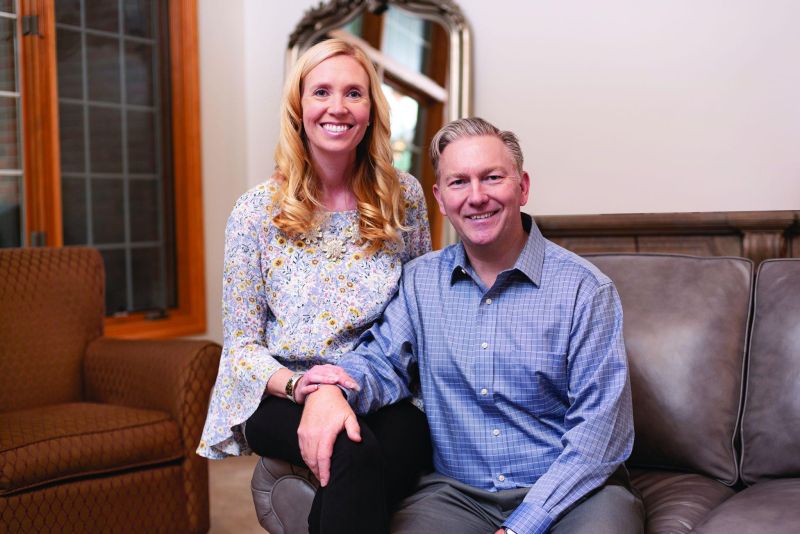Stopped in a heartbeat
When Dr. Christopher Ranney tells his patients to start making healthier choices now and not wait for a crisis in their lives, he speaks from experience. The 47-year-old family physician experienced a heart attack while running last fall. Now he emphasizes prevention, managing diet, stress and medications in the hopes that others won’t have to go through what he did.
With a mixture of disbelief and calm acceptance, Dr. Ranney remembers every detail of the day he suffered his heart attack. He and his running partner were well into their 5 a.m. 7-mile loop when Dr. Ranney noticed his throat was sore, the air seemed cold and there was a burning in his chest.
On their way back up Oak Hill Road, Dr. Ranney was out of energy and stopped running — something he had never done before. While his running partner sprinted back to the car to come back to pick up his friend, Dr. Ranney flagged down a “good Samaritan” for a ride. Meanwhile his running partner sent a text to Dr. Ranney’s wife about his medical concerns. The result was an immediate trip to the Wooster Community Hospital Emergency Room.
At the time Dr. Ranney didn’t think his physical problems related to his heart. He had none of the usual symptoms like nausea, dizziness or shortness of breath.
Even though his initial vitals were normal, the doctors evaluating him wisely ran a second EKG, which showed he was having a heart attack. Within minutes he was in the cath lab, where interventional cardiologist Dr. Daniel Newton implanted a stent in his main coronary artery.
“It was literally 45 minutes from stopping my run to being in the cath lab,” Dr. Ranney said.
“Having the ability to do emergent acute angioplasty here at Wooster Community Hospital markedly improves the chance of survival from a myocardial infarction and minimizes the irreversible damage that may occur from a heart attack,” Dr. Newton said. “Without this program here, patients would have to be emergently transported to Akron, Canton or downtown Cleveland, causing a delay with intercepting heart attacks and increasing the chance of death. By placing Dr. Ranney’s stent so quickly, he virtually had no damage to his heart.”
Dr. Ranney’s heart attack was somewhat of an anomaly. He didn’t have alarmingly high cholesterol, was a healthy eater, exercised and had no family history of heart disease.
Dr. Newton agrees that Dr. Ranney’s symptoms were not the norm. “What is vital is that Dr. Ranney identified there was something wrong going on. He knew that heart attacks don’t always present in the traditional way, and he was wise to seek out medical attention as soon as possible. Around here we go by the motto, ‘If in doubt, rule it out.’ Come to the emergency room as Dr. Ranney did and make sure everything is OK.”
Today, Dr. Ranney’s lifestyle reflects this scare. He’s on a diet of “twigs and berries,” he said, which he translates as “reducing the amount of sugar and refined carbohydrates and increasing the amount of Omega 3’s, whole grains and vegetables.”
Dr. Ranney also has a new appreciation for safety and disease prevention. He encourages his patients at Milltown Family Physicians to eat healthier, practice stress management and consider prevention medications. “Taking one medication to lower my cholesterol would have been better than having a heart attack and now being on five medications,” Dr. Ranney said.
“If you run, run with a partner, carry identification and carry a phone,” Dr. Ranney said, which is something he did not have with him the morning of his heart attack.
He also has a new appreciation for health care as seen from the patient’s perspective. “I really appreciated the individual care I received,” he said. The cardiac rehab program at WCH transitioned him back to normal activity and exercise. “They tailored the program to fit my level of fitness.”
Gratitude is his new attitude. “My wife Christy and I are so thankful for our church family, co-workers, neighbors, friends and Wooster Community, that supported us during this time,” Dr. Ranney said. And they are thankful for each new day.
“Don’t wait for something bad to happen to your health in order to start making lifestyle changes. You are only given one body, so why not take care of it?” he said.
You can learn more about Wooster Community Hospital at woosterhospital.org or by calling 330-263-8144. Wooster Community Hospital is located at 1761 Beall Ave. in Wooster.

